
Geography Compass
Scope & Guideline
Fostering Dialogue in the Diverse World of Geography
Introduction
Aims and Scopes
- Interdisciplinary Geographical Research:
The journal emphasizes the integration of various disciplinary perspectives within geography, facilitating a broader understanding of spatial phenomena and their complexities. - Critical Engagement with Contemporary Issues:
A strong focus on contemporary issues such as climate change, social justice, urbanization, and globalization is evident, encouraging researchers to address urgent societal challenges. - Methodological Innovation:
Geography Compass promotes innovative methodologies, including qualitative, quantitative, and mixed-methods approaches, to enhance the depth and breadth of geographical research. - Focus on Social and Environmental Justice:
The journal consistently highlights themes related to social and environmental justice, exploring the intersections of power, identity, and space. - Global Perspectives:
Research that examines geographical phenomena from a global perspective, particularly in relation to the Global South and transnational issues, is a key area of focus.
Trending and Emerging
- Racial Capitalism and Social Justice:
There is a growing emphasis on exploring the intersections of race, capitalism, and social justice, highlighting how these dynamics shape urban spaces and societal structures. - Digital Geographies and Datafication:
The rise of digital technologies and datafication in geographical research is increasingly prominent, with studies examining their implications for urban justice, governance, and social movements. - Environmental Justice and Climate Change:
Research focused on environmental justice and the impacts of climate change is gaining traction, emphasizing the need for equitable approaches to sustainability and urban planning. - Geographies of Resistance and Activism:
Emerging themes include the geographies of resistance and activism, particularly in relation to extractivism, social movements, and community organizing. - Intersectionality in Geography:
There is a notable trend towards incorporating intersectional frameworks in geographical research, addressing how various identities (e.g., gender, race, class) intersect and influence spatial experiences.
Declining or Waning
- Traditional Economic Geography:
There appears to be a waning interest in conventional economic geography, particularly studies focused solely on industrial development and economic metrics, as the field shifts towards more critical and socially-engaged perspectives. - Historical Geography of Settlements:
While historical geography remains relevant, the specific focus on traditional settlement patterns and their historical contexts has decreased, giving way to more dynamic and critical interpretations of space and place. - Geography of Nationalism:
Research specifically centered on nationalism and state-centric geographical studies has seen a decline, as scholars increasingly explore post-national and transnational frameworks. - Static Geographical Models:
There is a noticeable reduction in the publication of static models that do not incorporate dynamic social processes or contemporary challenges, as the journal favors more fluid and adaptable approaches. - Conventional Cultural Geography:
The focus on conventional cultural geography, particularly studies that do not engage with contemporary social issues, has diminished in favor of more critical and intersectional analyses.
Similar Journals

Geographica Pannonica
Championing Open Access for Geographical ExcellenceGeographica Pannonica is a premier, open-access journal dedicated to the various dimensions of geography, atmospheric sciences, geology, and related fields. Published by the University of Novi Sad's Faculty of Natural Sciences and Mathematics, this Serbian journal has been a vital platform for scholarly discourse since its inception, with an open-access policy established in 2010 to enhance the dissemination of research findings. Covering a spectrum of topics from Earth-surface processes to tourism management, the journal has achieved notable rankings, reflecting its commitment to impactful research—ranking in the Q3 quartile across multiple categories in 2023. Researchers, professionals, and students are encouraged to engage with the latest articles that contribute to advancing our understanding of geographical phenomena and sustainability challenges, making Geographica Pannonica an essential resource for the global academic community.
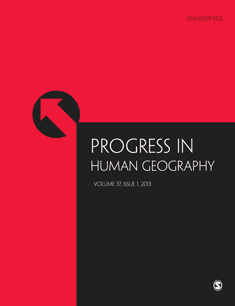
PROGRESS IN HUMAN GEOGRAPHY
Connecting Theory and Practice in GeographyPROGRESS IN HUMAN GEOGRAPHY is a leading journal dedicated to advancing the field of human geography, published by SAGE PUBLICATIONS LTD in the United Kingdom. With a strong impact factor and ranked in the Q1 category for Geography, Planning and Development in 2023, this journal stands out as a critical platform for publishing original research that shapes contemporary geographic thought. Established in 1977, it continues to present pioneering studies and theoretical developments that address pressing social and environmental issues. The journal's prominence is evidenced by its impressive Scopus rank of 10 out of 821 in the field, placing it in the top 2% of social sciences journals. While it does not currently offer Open Access options, PROGRESS IN HUMAN GEOGRAPHY remains committed to providing high-quality academic discourse that not only informs but also inspires future geographical research. Researchers, professionals, and students alike will find this journal to be an essential resource for insights and advancements in the dynamic landscape of human geography.
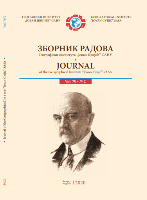
Journal of the Geographical Institute Jovan Cvijic SASA
Illuminating the complexities of our world through research.The Journal of the Geographical Institute Jovan Cvijic SASA is a premier academic publication dedicated to advancing research and knowledge in diverse fields such as Demography, Earth-Surface Processes, Geography, Geology, and Tourism. Published by the Geographical Institute Jovan Cvijic SASA in Serbia, this Open Access journal has made significant contributions to the academic community since its inception in 1951, allowing for unrestricted dissemination of research findings globally. With an impact factor reflected in its 2023 Q3 quartile rankings across several categories, the journal underlines its relevance by maintaining a significant standing in the Social Sciences and Earth and Planetary Sciences domains, demonstrating engagement at a global level evidenced by its Scopus rankings. The journal's commitment to publishing high-quality, peer-reviewed articles makes it an essential resource for researchers, professionals, and students seeking to explore and enhance their understanding of geographical and environmental dynamics.
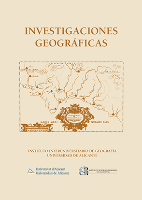
Investigaciones Geograficas-Spain
Advancing geographical knowledge for a sustainable future.Investigaciones Geográficas-Spain is an esteemed academic journal published by the Universidad de Alicante, dedicated to advancing the fields of geography, planning, and development as well as earth and planetary sciences. With its commitment to open access since 1983, the journal ensures that research is readily available to a global audience, facilitating knowledge dissemination and collaborative discourse. As reflected in its 2023 Scopus rankings, it holds a commendable position within the Q3 category in both Earth and Planetary Sciences and Geography, Planning and Development, making it a noteworthy resource for scholars and practitioners in these disciplines. The journal's scope encompasses diverse geographical research, aiming to address pressing environmental and societal challenges through empirical studies and theoretical advancements. By contributing to the knowledge reservoir from Spain and beyond, Investigaciones Geográficas-Spain serves as a vital platform for researchers, professionals, and students seeking to enrich their understanding of geographical phenomena.
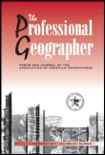
PROFESSIONAL GEOGRAPHER
Championing Groundbreaking Research in Geography Since 1949PROFESSIONAL GEOGRAPHER is a prominent journal in the fields of geography and earth-surface processes, published by Routledge Journals, Taylor & Francis Ltd. With a rich history dating back to 1949 and continuing through 2024, it serves as a vital platform for researchers, professionals, and students to explore and disseminate groundbreaking research and insights within the geographical sciences. The journal holds a respectable impact factor, placing it in the Q2 quartile for both Earth-Surface Processes and Geography, Planning and Development as of 2023, highlighting its importance in these critical academic areas. The journal ranks #273 out of 821 in Geography and Planning and #70 out of 179 in Earth and Planetary Sciences on Scopus, reflecting its robust contribution to advancing knowledge in social sciences. Although it does not currently offer open access options, it still provides invaluable content that influences pedagogy and research in geography. Its comprehensive scope invites a wide range of geospatial topics, encouraging interdisciplinary dialogue and collaboration across the global academic community.
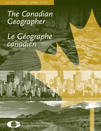
CANADIAN GEOGRAPHIES-GEOGRAPHIES CANADIENNES
Advancing Geographical Insights Across BordersCanadian Geographies-Geographies Canadiennes, published by Wiley, stands as a prominent peer-reviewed journal dedicated to advancing knowledge in the fields of geography and environmental studies. With an ISSN of 0008-3658 and an E-ISSN of 1541-0064, this journal has been an essential resource since its inception in 1950, reflecting on geographical phenomena and their implications in the context of Canadian landscapes and beyond. The journal boasts a consistent reputation, classified in the Q2 category within both Earth-Surface Processes and Geography, Planning and Development, as of 2023. Additionally, it ranks impressively within Scopus, holding the 75th percentile in Social Sciences and 70th in Earth and Planetary Sciences. Although it does not offer open access, its rigorous editorial standards ensure high-quality research contributions for academics and practitioners aiming to explore the complexities of geographical studies. With its headquarters located in Hoboken, NJ, this journal not only underscores the significance of geographical research in North America but also provides a platform for interdisciplinary collaboration among researchers, professionals, and students in the increasingly vital field of geography.
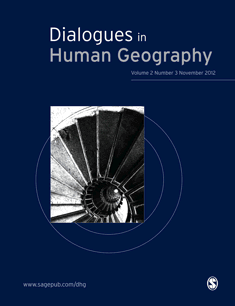
Dialogues in Human Geography
Exploring the Intersections of Space and SocietyDialogues in Human Geography is a leading journal published by SAGE Publications Ltd, specializing in the dynamic and evolving field of human geography. With an ISSN of 2043-8206 and an E-ISSN of 2043-8214, this esteemed journal is notable for its Q1 ranking in the Geography, Planning and Development category, placing it in the top tier of social science publications. As of 2023, it boasts an impressive Scopus rank of 73 out of 821, positioning it within the 91st percentile, illustrating its significance and influence in academic discourse. Since its inception in 2011, the journal has aimed to foster critical exchanges and innovative perspectives on complex spatial and social issues. Researchers, professionals, and students alike will find engaging and thought-provoking contributions that challenge traditional notions within the field, making it an essential resource for anyone invested in understanding the intricate relationships between people and their environments.
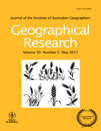
Geographical Research
Shaping the Future of Geographic UnderstandingGeographical Research, published by WILEY, is a premier academic journal based in the United Kingdom, dedicated to advancing knowledge in the fields of Geography, Planning, and Earth-Surface Processes. With an impact factor that reflects its high academic caliber, this journal ranks in the Q2 category for Earth-Surface Processes and Q1 in Geography, Planning and Development, highlighting its influential role in shaping contemporary research within these disciplines. The journal's Scopus rankings further underscore its significance, standing at #175 out of 821 in Geography, and #41 out of 179 in Earth-Surface Processes, placing it within the top 78th and 77th percentiles, respectively. Since its inception in 2005, Geographical Research has continuously provided a vital platform for scholars to disseminate innovative research, fostering dialogue and collaboration across disciplines. Although currently not open access, its content remains indispensable for researchers, professionals, and students aiming to deepen their understanding of geographical phenomena and develop strategic insights for planning and development.

Cadernos de Geografia
Connecting Global Perspectives through Open Access GeographyCadernos de Geografia is a distinguished biannual journal published by UNIVERSIDADE DE COIMBRA, FACULDADE DE LETRAS, dedicated to the field of geography and related social sciences. With its ISSN 0871-1623 and E-ISSN 2183-4016, this journal has been a prominent platform for the dissemination of high-quality research since it became open access in 2012. Situated in Coimbra, Portugal, it aims to foster academic excellence by providing an inclusive space for innovative studies that explore contemporary geographical issues. Cadernos de Geografia encourages submissions that address diverse aspects of geography, ranging from environmental studies to urban planning, making it an invaluable resource for researchers, professionals, and students alike. As a part of the growing trend in open-access publishing, it enhances the global reach and accessibility of geographical research, thereby contributing to the enrichment of knowledge in the field.
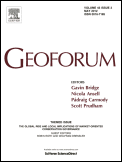
GEOFORUM
Unraveling Socio-Political Phenomena with Scholarly RigorGEOFORUM, a distinguished academic journal published by PERGAMON-ELSEVIER SCIENCE LTD, stands as a leading platform for scholarly discourse in the fields of Sociology and Political Science. Established in 1970 and currently extending its reach until 2024, the journal is recognized for its significant contribution to understanding complex socio-political phenomena on a global scale. With an impressive Q1 category ranking in the 2023 Scopus Quartile and an exemplary 94th percentile ranking among its peers, GEOFORUM positions itself as a vital resource for researchers, professionals, and students alike. The journal, while following a traditional access model, remains essential for disseminating impactful research that addresses contemporary socio-political issues. It not only enriches academic knowledge but also serves as a cornerstone for policy-making and sociological inquiry, making it a must-read for anyone invested in the humanities and social science fields.